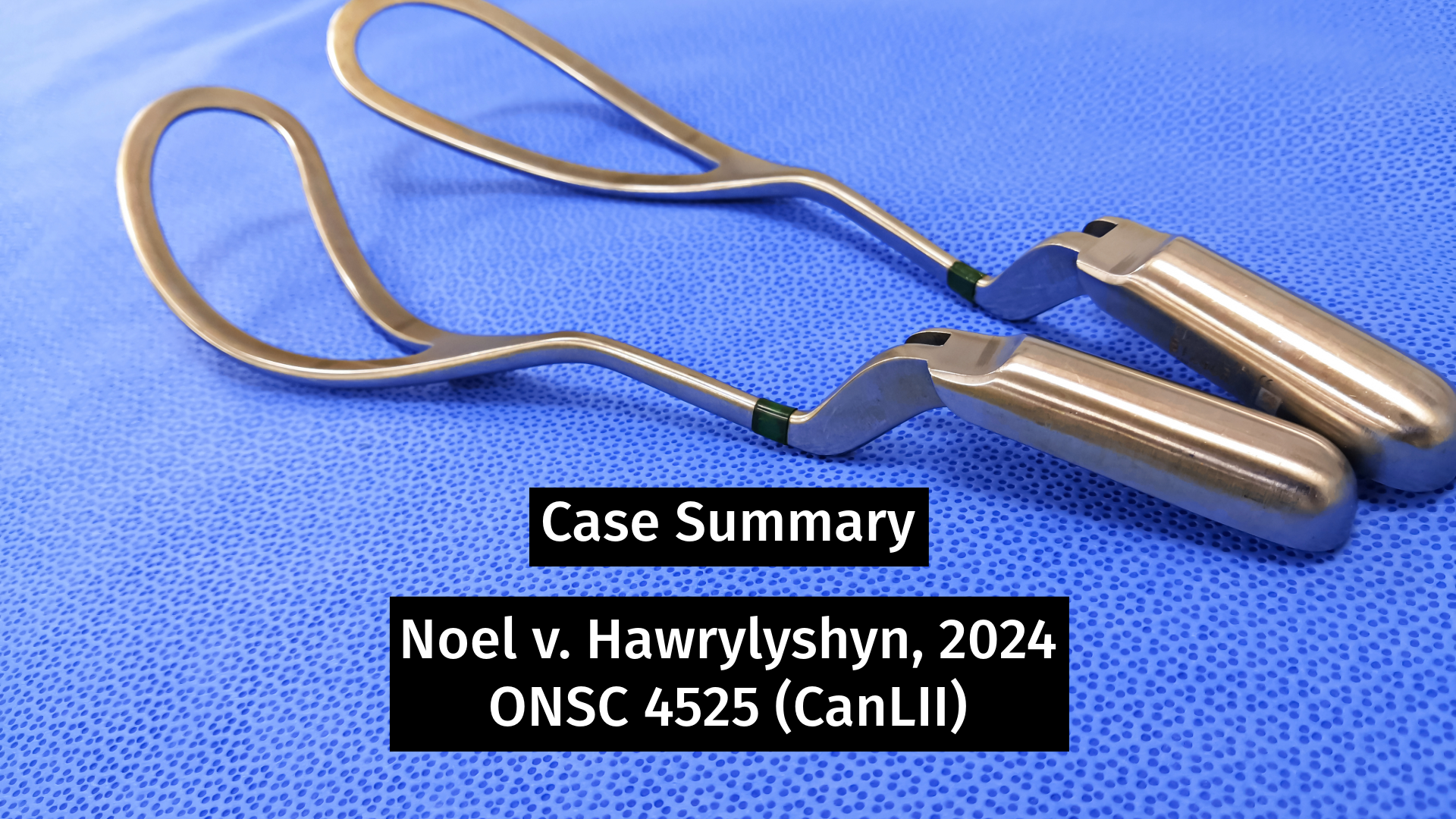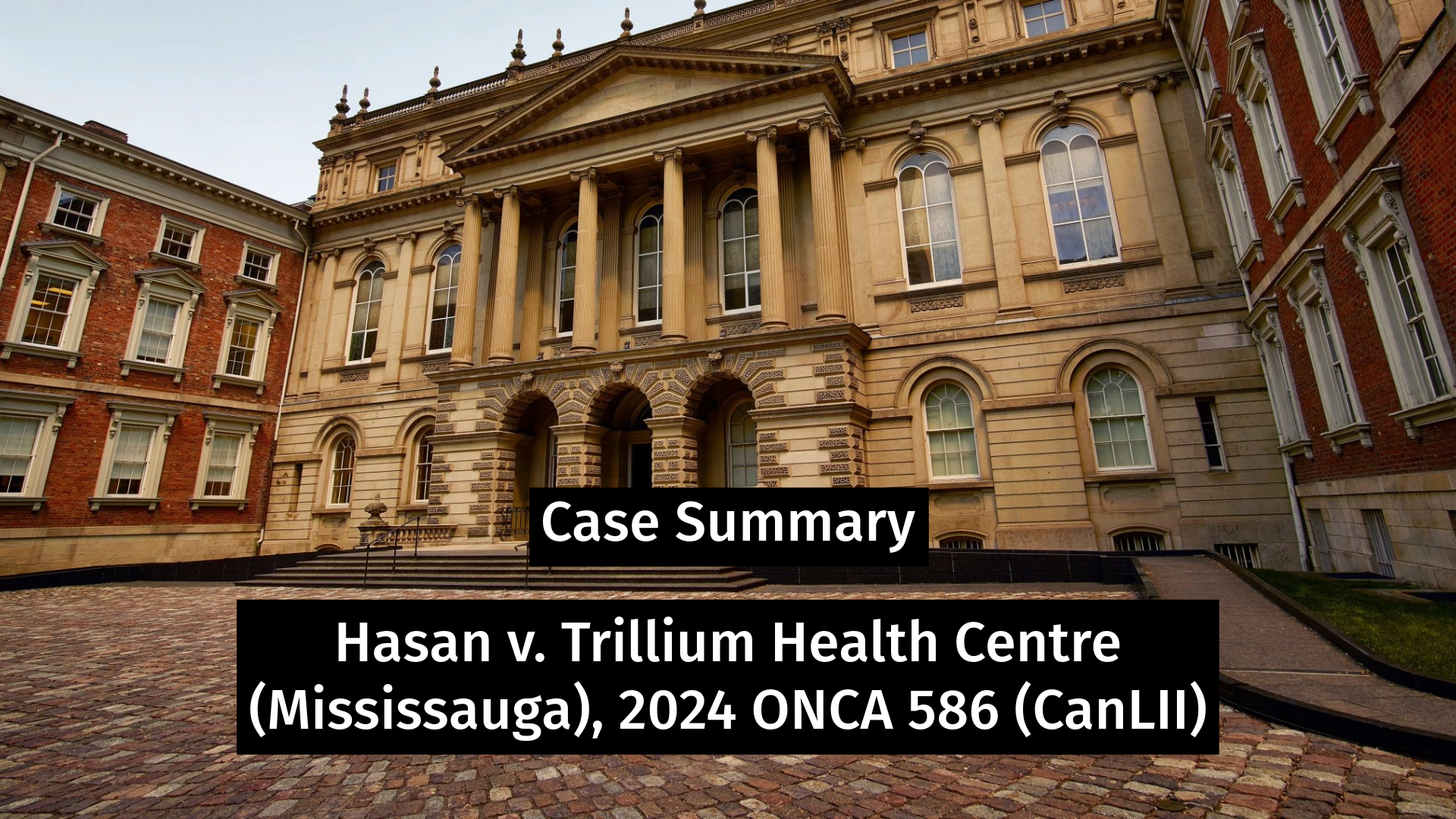On January 15, 2024, the Supreme Court of Nova Scotia granted a motion for summary judgement brought by the Defendant, Dr. Robert Grimshaw (“Dr. Grimshaw”), a qualified medical practitioner trained in the specialties of gynecology and obstetrics, who performed a surgery on the Plaintiff, Daphne Thorburn (“Ms. Thorburn”), to remove a mass on her right ovary.
Ms. Thorburn brought a claim against Dr. Grimshaw for damages alleged to have been caused by his medical negligence and/or failure to obtain informed consent. Dr. Grimshaw brought a motion for dismissal of both causes of action on three grounds: (1) summary judgement on evidence, (2) failing to bring the matter to trial within a reasonable time and (3) that the action is an abuse of process.
The judge granted the motion for summary judgement on evidence and, therefore, did not consider the motions for delay or abuse of process.
FACTS
On November 6, 2015, Ms. Thorburn saw Dr. Grimshaw in a consultation for a mass on her right ovary. Dr. Grimshaw advised that to determine whether the mass was malignant or benign, the mass had to be removed. Dr. Grimshaw conducted the surgery on December 10, 2015, at the Victoria General Hospital in Halifax, Nova Scotia. Following the surgery, Ms. Thorburn had to be returned to the operating room to stop internal bleeding.
Ms. Thorburn alleged that the surgery left her with an “ugly” and “disfiguring” scar, and that she did not anticipate being disfigured to this extend by surgery. She alleged liability against Dr. Grimshaw on two bases: (1) that he was negligent and (2) that he conducted the surgery without informed consent, constituting an “assault”.
DECISION
The judge found that Dr. Grimshaw had established that he is entitled to summary judgement on evidence on both causes of action: medical negligence and informed consent. The judge granted the summary judgement motion and dismissed the action.
The Law on Summary Judgement on Evidence
Summary judgement must be granted when a judge is satisfied that, (1) there is no genuine issue of material fact for trial of the claim or defence, and (2) the claim or defence requires determination only of a question of law and a judge exercises the discretion provided in Rule 13.04 to answer the question.
The test on a motion for summary judgement on evidence was articulated by Justice Fichaud in Shannex Inc v Dora Construction Ltd, 2016 NSCA 89. The five sequential questions to be asked when summary judgement is sought are as follows:
- Does the challenged pleading disclose a genuine issue of material fact, either pure or mixed with a question of law?
- If the answer to above is No, then: does the challenged pleading require the determination of a question of law, either pure, or mixed with a question of fact?
- If the answers to the above are No and Yes respectively, does the challenged pleading have a real chance of success?
- If there is a real chance of success, should the judge exercise the discretion to finally determine the issue of law?
- If the motion for summary judgment is dismissed, should the action be converted to an application, and if not, what directions should govern the conduct of the action?
The moving party has the onus to show by evidence that there is no genuine issue of material fact, and the test must be applied to each cause of action.
Medical Negligence
The success of a claim for medical negligence depends on the existence of four conditions:
- There must have been a legal duty on the part of the doctor towards his patient to exercise care. This duty arises as a matter of law when the doctor takes on the case, and as already stated, is independent of contract.
- There must have been negligence on the part of the doctor, i.e. a breach of his legal duty to conform to the standards of proficiency and care required by law.
- The patient must have suffered loss or injury. Negligence not resulting in loss or injury provides no ground for a civil action in damages.
- The patient’s loss or injury must have resulted directly from the doctor’s negligence. In other words, the negligence must have been the determining (as distinct from the indirect or remote) cause of the damage.
The standard of care, as described in Anderson v Queen Elizabeth II Sciences Centre, 2012 NSSC 360, is as follows:
Every medical practitioner must bring to his task a reasonable degree of skill and knowledge and must exercise a reasonable degree of care. He is bound to exercise that degree of care and skill which could reasonably be expected of a normal, prudent practitioner of the same experience and standing, and if he holds himself out as a specialist, a higher degree of skill is required of him than one who does not profess to be qualified by special training and ability.
The judge noted that medical negligence typically cannot be established without an expert opinion supportive of the Plaintiff’s position. Ms. Thorburn did not provide any expert evidence to support that Dr. Grimshaw’s care failed to meet the required standard of care, nor that his care caused or contributed to any loss or injury to Ms. Thorburn. Further, Dr. Grimshaw was not required to provide any evidence. As such, the judge held that Ms. Thorburn’s case in negligence against Dr. Grimshaw had no chance of success at trial and, therefore, granted summary judgement on the claim in negligence.
Informed Consent
Lack of informed consent does not constitute an assault in tort but may constitute either a battery or negligence. The leading case on informed consent in Canada is Reibl v Hughes, 1980 CanLII 23 (SCC), [1980] 2 SCR 880. In that case, the Supreme Court of Canada (“SCC”) stated:
… actions of battery in respect of surgical or other medical treatment should be confined to cases where surgery or treatment has been performed or given to which there has been no consent at all or where, emergency situations aside, surgery or treatment has been performed or given beyond that to which there was consent.
This standard would comprehend cases where there was misrepresentation of the surgery or treatment for which consent was elicited and a different surgical procedure or treatment was carried out. …
In contrast, the SCC held that “a failure to disclose the attendant risks, however serious, should go to negligence rather than to battery”.
The judge held that Ms. Thorburn failed to present any evidence to support a claim for battery, despite having more than twelve months to do so. Her affidavit did not contain evidence that she received a treatment to which no consent was given. She also did not dispute in her affidavit that she received the surgery that she expected to receive. Her affidavit supported a conclusion that consent was given but argued that the consent was vitiated. Therefore, the judge held that Ms. Thorburn’s informed consent allegations are properly considered in negligence.
To succeed in an argument that Dr. Grimshaw was negligent for not obtaining informed consent, Ms. Thorburn must satisfy the court that the alleged risks that were not consented to were material, special or unusual.
Ms. Thorburn’s claim of lack of informed consent was based on three allegations: (1) failure to inform her of alternative options to surgery, (2) lack of consent to have medical residents participate in her surgery and (3) failure to inform her of severe internal bleeding.
While Ms. Thorburn did not specifically plead that the lack of informed consent constituted negligence, the judge considered the issue of informed consent in negligence given that Ms. Thorburn was self-represented. The issue was whether she had offered any evidence to establish a genuine issue of material fact of any of her claims. Dr. Grimshaw submitted that Ms. Thorburn required expert evidence to support that any of the three allegations made on informed consent are material issues warranting a trial. She had not done so, despite ample time and opportunity.
(i) Ms. Thorburn did not provide evidence of any alternative treatment options
The judge held that evidence as to whether there were other medically viable and available options could only be properly substantiated by expert opinion. Ms. Thorburn is not a qualified medical expert and cannot give evidence as to whether there were other reasonable medical options available beyond the surgery that Dr. Grimshaw proposed. Further, at the time the motion was heard, over a year had passed since Ms. Thorburn was given an opportunity to secure the evidence necessary to support her claim.
(ii) Ms. Thorburn consented to medical residents assisting in surgery and failed to prove material, special or unusual risk
The judge held that Ms. Thorburn did not tender evidence or expert opinion to support an argument that the involvement of surgical residents was a material, special or unusual risk. Further, she signed a standard consent form which included consent not only to the attending surgeon, but also to “those whom he/she may designate as associates or assistants”. She, therefore, failed to show that this is a genuine issue of material fact warranting a trial.
(iii) Ms. Thorburn was informed of the material risks and consented to the surgery
The judge held that Ms. Thorburn’s assertion that she ‘was not advised that severe internal bleeding was a risk of this procedure’ and that she ‘did not anticipate this as being within the realm of potential outcomes’ is unsubstantiated. Nowhere in her affidavit did she indicate that her claim of assault due to lack of informed consent is predicated on Dr. Grimshaw’s alleged failure to inform her of the risks of internal bleeding. Dr. Grimshaw also placed into evidence a consent form that Ms. Thorburn signed, which listed “bleeding” as a “common, foreseeable [risk] or potentially serious [consequence] of the treatment”. Given the existence of the consent form, Ms. Thorburn was compelled to provide some evidence that would establish a genuine issue of fact about consent. She did not do so.
Therefore, the judge held that Dr. Grimshaw was also entitled to summary judgement on the claim of informed consent.
Decision Date: January 15, 2024
Jurisdiction: Supreme Court of Nova Scotia
Citation: Thorburn v Grimshaw, 2024 NSSC 15 (CanLII)



